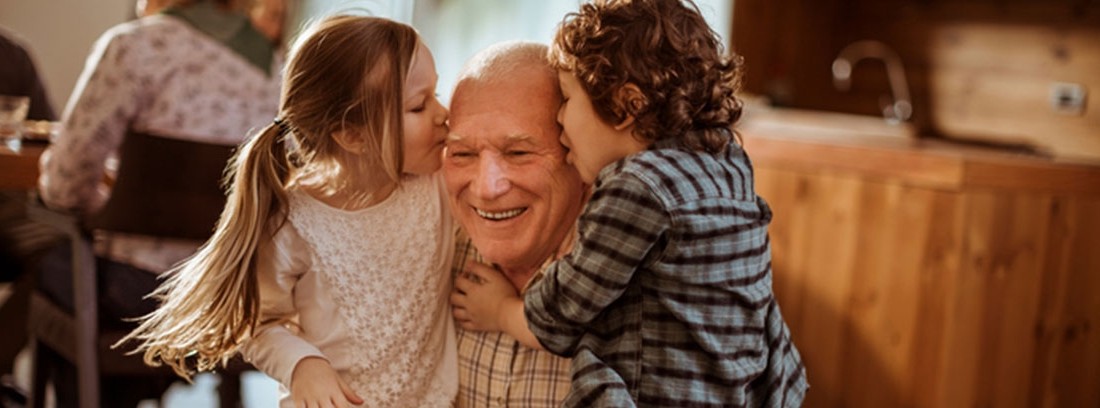Grandparents and grandchildren

The relationships between the elderly and children are no longer those that had traditionally occurred, which reflects the change that both have experienced in Western society for some time now.
WHAT YOU SHOULD KNOW
- Between 8 and 10 years old, the elderly are seen as an extension of their parents; between the ages of 10 and 12 as autonomous persons and between the ages of 11 and 14 they come to be considered "colleagues".
- Grandparents play an important role in the development and growth of the child: they help to establish bonds and create emotional ties.
- We must foster relationships between generations since it is a way of educating children and young people in respect for the elderly.
What do we understand by grandparents?
Today, the image that children tend to have of their grandparents (and of older people in general) is more dynamic and vital than it was in the past. In addition, this perception is changing and is being configured from the experiences they share with them. Thus, between the ages of 8 and 10, the elderly are seen as an extension of their parents; between the ages of 10 and 12, as autonomous persons and between the ages of 11 and 14, they are even considered as “colleagues”.
A changing relationship
This complicity relationship with grandparents is one of the aspects that differs the most from other moments in our history and that arises as a consequence of social changes, which have a special impact on the family structure. In this sense, phenomena such as the appearance of new family models or the incorporation of women into the labor market have favored equal relationships, in which grandparents and grandchildren share more activities and interests. However, here too the models are diverse, since relationships with grandparents who live far away, especially if they are from a rural population, tend to be more distant and in them the image that children have of older people is more similar to the model traditional value transmitter.
What role do they play in the family?
Grandparents play an important role in the family, and in it they perform many important functions that have to do with it. This helps to establish bonds and create affective bonds, which favor their development and learning.
The fact of living close to the family home and having more time than the parents facilitates a more continuous and close contact that is enriching for the two generations and that takes the form of voluntary inter-generational cooperation activities such as storytelling. stories, the transmission of knowledge and stories, participation in youth projects ... In addition, the presence of the grandfather at certain times can be very beneficial for the child and the young person, if he is able to bring him serenity, tenderness and quality time. For this reason, they can become a basic element of support when problems appear within the family. An example of this help is that offered by grandparents who take care of their grandchildren, to whom they act as "", and which facilitates the parents' family and work conciliation.
Enhance the relationship
Relationships between generations are supportive and provide help in certain vital moments that are decisive for their development. For this reason, it is important to promote them, since it favors integration between the different generations, it is also a way of educating children and young people in respect for the elderly and a way for them to better understand the young generations. In addition, it has been shown that social conflict is reduced. In short, the relationships between children and the elderly are not only good and positive, but must be strengthened: "not a child without a grandparent, not an older person without a child." BENEFITS FOR OLDER AND YOUNG PEOPLE
The positive effects of intergenerational relationships are clear for both groups:
- For the elderly it is a clear benefit at the mental level (reduction of depression and anxiety, possible delay in the appearance of cognitive deterioration), they develop social skills and enhance qualities such as a more flexible mentality, as well as empathy. Older people also realize that they can exchange knowledge and experiences with them, being transmitters of their past, and of popular culture sometimes forgotten or unknown by the little ones. They feel accepted, consider themselves useful, and gain self-confidence.
- Young people improve academic performance and strengthen their self-esteem and optimism. Regarding their attitude towards older people, by interacting with them they form a more positive idea, without stereotypes, and they respect adults in general more. They reduce antisocial behaviors, strengthen relationships with family and with close colleagues and friends, limit health risk behaviors, and participate more in physical activities. They recognize values such as respect, friendship, tolerance, patience or generosity. On the other hand, they observe feelings and situations of loneliness, isolation or illness, and they know part of their most recent local and family history.
(Updated at Apr 14 / 2024)